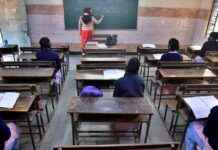6.5 Million Students Fail Board Exams 2023; UP and MP Boards Worst Performers
According to officials from the Ministry of Education, over 6.5 million students were unable to pass the 10th and 12th-grade board exams in the previous year. The results of 59 school boards were analyzed, revealing a significantly higher failure rate in state boards compared to central boards. The ministry had evaluated 56 state boards and three national boards as part of their research.
One striking finding from the report was the gender discrepancies observed across different types of schools. It was noted that more girls from government-managed schools appeared for the class 10 and 12 board examinations, while the trend was reversed in private and government-aided schools, where more boys participated. An official suggested that this disparity might reflect gender bias in parental spending on education.
Despite the challenges faced by students, girls were reported to have outperformed boys in terms of pass rates across government, aided, and private schools. In the class 10 exams, approximately 3.3 million students failed to progress to the next grade level, with 550,000 of them being absent for their examinations. Similarly, around 3.2 million class 12 students did not successfully complete the grade, including 520,000 who failed to pass.
State-wise Performance
When comparing the performance of state boards, it was found that the Madhya Pradesh board had the highest number of student failures in class 10, followed by Bihar and Uttar Pradesh. In class 12, Uttar Pradesh reported the highest number of student failures, followed by Madhya Pradesh.
The failure rates for class 10 were 6 per cent in central boards and 16 per cent in state boards. For class 12, the failure rates were 12 per cent in central boards and 18 per cent in state boards. These statistics highlight the need for targeted interventions to improve the academic outcomes of students across different states.
Challenges Faced by Students
The high number of students failing the board exams raises concerns about the quality of education and the support systems available to help students succeed. Factors such as inadequate resources, lack of proper guidance, and socio-economic disparities can contribute to student underperformance.
It is crucial for educational institutions and policymakers to address these challenges and provide students with the necessary tools and support to excel academically. Initiatives such as remedial classes, counseling services, and mentorship programs can help students overcome academic difficulties and reach their full potential.
Gender Disparities in Education
The gender differences observed in the participation and performance of students in board exams underscore the need to address gender biases in education. Girls from government-managed schools showing higher participation rates may indicate the importance of access to quality education for girls.
On the other hand, the lower participation of girls in private and government-aided schools suggests barriers that prevent them from pursuing education beyond a certain level. It is essential to create a supportive and inclusive learning environment that encourages both girls and boys to excel academically.
Recommendations for Improvement
To improve the overall performance of students in board exams, several recommendations can be considered. First, there is a need for comprehensive teacher training programs to enhance teaching methodologies and support student learning. Additionally, schools should focus on creating a conducive learning environment that promotes academic excellence and encourages student engagement.
Furthermore, the implementation of student support services such as career counseling, academic tutoring, and mental health resources can help students overcome challenges and succeed academically. By addressing the root causes of student failure and providing targeted interventions, educational institutions can empower students to achieve their academic goals.
In conclusion, the high number of students failing the board exams highlights the urgent need for educational reforms and support mechanisms to improve student outcomes. By addressing the underlying issues contributing to student underperformance and implementing targeted interventions, we can create a more equitable and inclusive education system that enables all students to thrive academically.




















